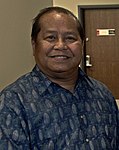Our website is made possible by displaying online advertisements to our visitors.
Please consider supporting us by disabling your ad blocker.
2014 Northern Mariana Islands general election
|
| ||||||||||||||||||||
Gubernatorial election | ||||||||||||||||||||
| ||||||||||||||||||||
| ||||||||||||||||||||
 Results by voting district: Eloy Inos: 50–55% 55–60% 60–65% 65–70% >95% Heinz Hofschneider: 50–55% | ||||||||||||||||||||
| ||||||||||||||||||||
Delegate election | ||||||||||||||||||||
| ||||||||||||||||||||
| ||||||||||||||||||||
 Results by voting district: Gregorio Sablan: 50–55% 55–60% 60–65% 65–70% 80–85% Andrew Salas: 60–65% | ||||||||||||||||||||
| ||||||||||||||||||||
6 of the 9 seats in the Senate 5 seats needed for a majority | ||||||||||||||||||||
This lists parties that won seats. See the complete results below. | ||||||||||||||||||||
All 20 seats in the House of Representatives 11 seats needed for a majority | ||||||||||||||||||||
This lists parties that won seats. See the complete results below. | ||||||||||||||||||||
 |
|---|
General elections were held in the Northern Mariana Islands on Tuesday, 4 November 2014. The elections coincided with the 2014 United States midterm elections. Voters in the Northern Mariana Islands voted for the governor of the Northern Mariana Islands, the non-voting delegate to the United States House of Representatives, attorney general, 6 seats in the Northern Mariana Islands Senate, all twenty seats in the Northern Mariana Islands House of Representatives, 4 mayors, seats for the municipal council, and seats for the board of education. Additionally, a referendum involving changes to the constitution was held.[1]
Incumbent Republican governor Eloy Inos was re-elected, facing two independent challengers and one Democratic challenger. The next lieutenant governor was elected on the same ticket, with incumbent Jude Hofschneider not running for re-election. As no candidate got a majority, a runoff was held on 21 November 2014.[2] This election was the first time since 2001 that the Covenant Party, which dissolved in 2013, was not on the ballot. It also marked the first time since 1999 that only two political parties would compete in the elections, marking a return to a two-party system similar to that of the United States rather than the multi-party system, which began back in 1999 when the now dissolved Reform Party was first formed and went on to win a stunning victory by managing to elect Senator Ramon Deleon Guerrero to the senate,[3] that had defined the CNMI for nearly 15 years. The Democratic Party would not win a single seat in the legislature until 2020 and would not compete for the governorship until 2022.
- ^ "Legislative Initiatives". Commonwealth Election Commission. Archived from the original on October 22, 2014. Retrieved May 4, 2015.
- ^ "Election 2014 Results". Commonwealth Election Commission. Archived from the original on November 30, 2014. Retrieved May 3, 2015.
- ^ "Analysis: What went wrong , what went right". Saipan Tribune. November 8, 1999. Retrieved December 27, 2023.
Previous Page Next Page





